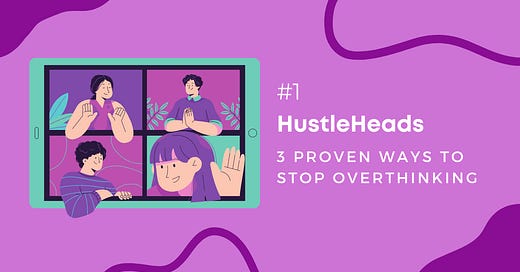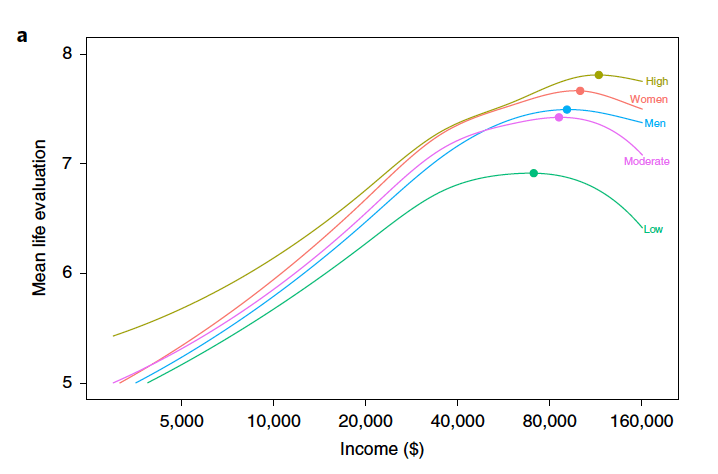3 Proven Ways to Stop Overthinking
While overthinking might sound petty, once it turns into an ongoing habit, it can keep us away from ever finishing our work, lead to procrastination, and even cause serious mental health issues.
In this post, I’d love to share the three proven techniques I use to cope with overthinking. I will also share a few findings to give you an idea of why overthinking should be talked about and some tips to avoid or cope with it.
I have struggled with overthinking for almost all my life. I’ve always attributed it to my personality type. I am an introvert, and I love being an introvert. However, one of the side effects of being one is overthinking. If you’re like me and have difficulty in making decisions because there are conflicting opinions in your head, keep reading.
What makes me overthink?
I think that stress and anxiety are the main two basic things that turn on conflicting opinions in my head and lead to overthinking. From observation, I think I have two types of overthinking behaviour:
Worrying overthinking — happens when I let my mind drift into the future and think about things that can go wrong.
Ruminating overthinking — when something from the past haunts me repeatedly, usually when I relive the same or similar event.
I found this self-discovery fascinating. I want to dive deeper into the thought processes that make me overthink:
If I put in more work, I get better results.
I remember that in the early days of my life, I used to think more, expecting that more thinking would result in better results. But in recent years, I realised that just like managing my finances, overthinking after a certain level can have diminishing returns or sometimes worse outcomes.
Just like in the case of making money: after a point, money can only make us happier to a certain extent, and similarly, thinking can only yield better results up to a certain extent, beyond which there is little to no gain.
I observed that when preparing for an exam, overpreparing after a certain point always leads to worse results than preparing with a focused mind for a few hours.
If something works for A, it’ll work for B.
The one-size-fits-all approach that I often bring into thinking usually fails, but I still do it anyway because anxiety makes me do it. At least now, I am more self-aware of my thought process before I spend hours thinking about it.
After indulging in this thought process, I've found myself drained of energy levels with just a few simple tasks. For example, I was obsessed with switching to plant-based milk. And I started reading about it, dedicating hours of research to understanding the benefits and costs of switching to plant-based milk. The gains in personal health after switching to plant-based milk were minimal, but the time and energy spent on the switch was exorbitant. I switched back to regular milk a few weeks later.
I need to be prepared.
Were you the kind of student who prepared for the exam even minutes before it started? Well, I was, and I am pretty sure some of you guys were, too. Naval Ravikant admitted that he had to prepare for the Joe Rogan podcast because he couldn’t stop his mind from having an imaginary conversation.
“A few days leading up to this [episode], my mind was just running, and normally my mind is pretty calm. It was just running, running, and running. And every thought I’d have, I’d imagine me saying it to you. My brain couldn’t help but rehearse.” — Naval Ravikant on Joe Rogan podcast.
This happens primarily because of the human instinct to want to be in control and ensure that we’re prepared for all possible outcomes. Being prepared is not bad, but striking the right balance between being prepared and being calm is better, in my opinion.
Why is overthinking bad?
Constantly ruminating or worrying about someone or something can have serious repercussions. Here are some consequences of overthinking:
😞 High chances of Depression
A study published in the Journal of Abnormal Psychology shows that overthinking can lead to severe mental health issues, including depression. So, if a traumatic event wasn’t enough, overthinking can take it up the notch and turn it into depression and anxiety.
“[..] Rumination was a mediator of the longitudinal association between self-reported stressful life events and anxiety symptoms among adolescents and adults and both males and females. In addition, rumination significantly mediated the relationship between self-reported stressful life events and increases in depressive symptoms in adults, but not in adolescents.”
♾️ Impairs Problem Solving
According to this study, rumination is to depression, what oxygen is to flame. The study was conducted by scientists from Yale and UCR to determine to what extent rumination exacerbates depression, enhances negative thinking, and impairs problem-solving.
“Specifically, rumination appears to more consistently predict the onset of depression rather than the duration, but rumination interacts with negative cognitive styles to predict the duration of depressive symptoms.”
When we look at these results and why we overthink, we find that we are in an analysis paralysis and worry even further.
“[…] rumination maintains and exacerbates depression by enhancing negative mood-congruent thinking, impairing problem-solving and instrumental behaviour, and deterring social support.”
🤯 Overloads our brain
A recent study has shown that the less-is-more approach works great for creative tasks. Plus, you’ll save a lot of time you’d otherwise spend overthinking.
3 Proven ways to stop overthinking
🧘 Meditation
When I talk to successful people in tech, entrepreneurship, or the creative space, they all agree that meditation helps them clear their minds. Justin Kan, the co-founder of Twitch, mentioned in an episode of the podcast Not Overthinking that he was very bullish on meditation.
“Meditation has made me much more accepting of my present-moment experience. Whatever it is. Whether it’s great and joyful – things that are easy to accept in daily life but also when I’m feeling guilty, angry or when something bad happens. So, for me, meditation is the most important skill I’ve ever learnt because I’m no longer fighting against my experience.”
“Practising meditation enables you to recognise that the thoughts and stories that are generated by your mind are not who you are. By meditating you learn to step out and observe those thoughts and stories rather than believing them.” — August Bradley, Business performance coach, strategist, entrepreneur and Notion expert.
“Meditation is not just about sitting quietly for a few minutes every day – it’s about training the brain to filter out negative thought processes that hamper us daily.” — UnJaded Jade, YouTuber.
Naval shared his secret on getting started with meditation on the podcast with Joe Rogan.
“Sit down, close your eyes, comfortable position, whatever happens, happens. If you think, you think. If you don’t think, you don’t think. Don’t put effort into it. Don’t put effort against it. […] You just sit.” — Naval Ravikant on Joe Rogan podcast.
Check out this guided meditation from Davina and Alex on spotify.
🙇 Seek forgiveness over permission
“Seek forgiveness rather than permission” — Ali Abdaal, author of Feel Good Productivity, Youtuber and productivity expert.
When we overthink about an idea over and over again, we eventually get scared of committing to our choices, and over time, worrying becomes our default response. If you are a person who constantly have to deal with this, here is a strategy that I use:
Think about the worst possible outcome that could happen, if you go ahead and do what you want to do. Chances are that the reality is less scary than you’ve assumed it to be.
Next, think about the chances of this worst case scenario happening. Most likely the chances are negligible.
This way, instead of sitting on your idea and overthinking about the consequences, you do it and then (if needed) seek forgiveness.
🚪 Hold the Door
Another proven way to stop overthinking is to create intentional distractions. While I was studing Computer Science at Amrita University, I quickly realised that while preparing for exams, spending a couple more hours solo-learning to get a 1% higher grade wasn’t worth it. So I decided to hold the door and keep it open and invite anyone who wanted to interrupt me while I was preparing.
This created an intentional distraction and kept me away from worrying too much about the exam. Plus, the added benefit of having fun and entertaining conversations with friends, thereby reducing my stress and anxiety.
And, that’s a wrap.
I hope you enjoyed this edition of HustleHeads and I hope it was useful for you. Do let me know your thoughts or your strategies to deal with overthinking in the comments section below.
Have a wonderful day!







